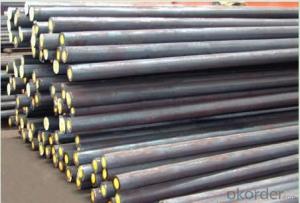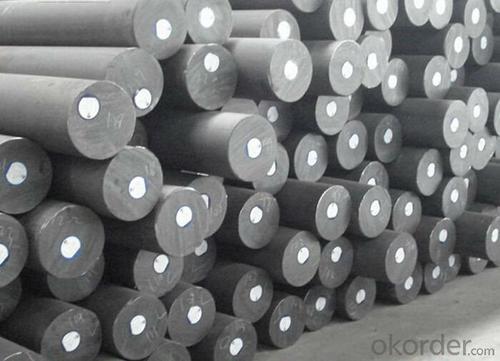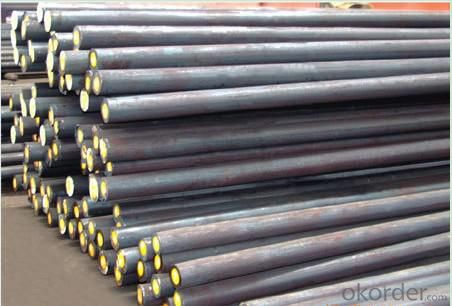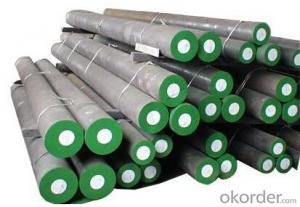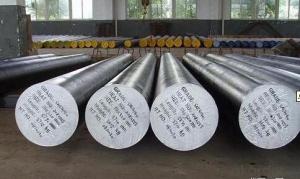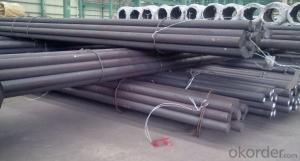Grade AISI4135 CNBM Alloy Steel Round Bar
- Loading Port:
- Shanghai
- Payment Terms:
- TT OR LC
- Min Order Qty:
- 25 m.t.
- Supply Capability:
- 10000 m.t./month
OKorder Service Pledge
OKorder Financial Service
You Might Also Like
Specification
Specification:
1. Produce Standard: GB, AISI, ASTM, SAE, EN, BS, DIN, JIS
2. Produce processes: Smelt Iron -EAF smelt Billet - ESR smelt Billet -Hot rolled or forged get the steel round bar and plate
3. Heat treatment: Normalized / Annealed / Quenched+Tempered
Chemical Composition:
Grade | Dia.(mm) | C | Si | Mn | Cr | P | S | Ni | Cu | Mo |
4135 | 13-230 | 0.32-0.40 | 0.17-0.37 | 0.40-0.70 | 0.80-1.10 | ≤0.035 | ≤0.035 | ≤0.03 | ≤0.03 | 0.15-0.25 |
Usage and Applications:
Mainly used in automobile manufacturing for the part of crankshaft, linkage,steering knuckle, wheel hub, door butt and semi-axle shaft sleeve..etd.
Packaging & Delivery:
Packaging Detail: Standard seaworthy packing or as customer required; all goods are packed in bundle with steel strips and shipped by break bulk vessel or container
Delivery Detail: 45 days
Production Flow:
hot forging/hot rolling + annealing/normalizing + tempering/quenching + tempering/any conditions based on the customer's requirement
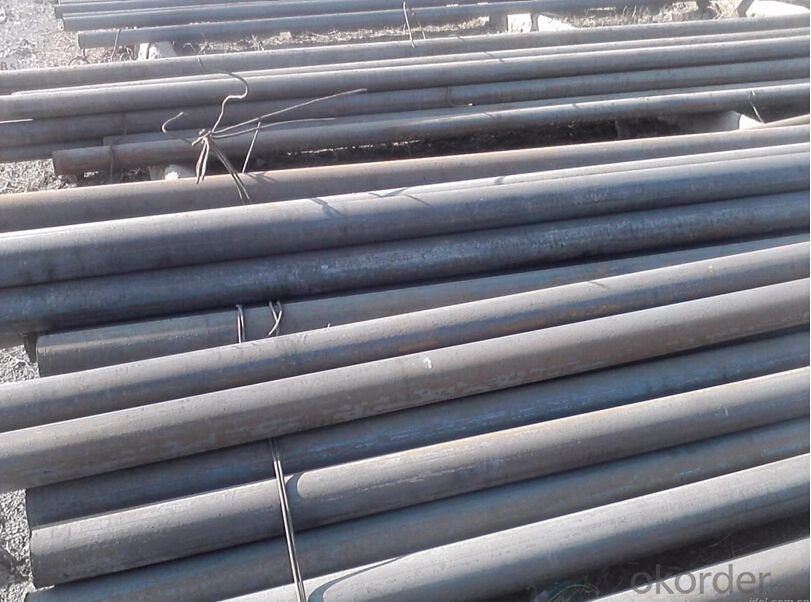
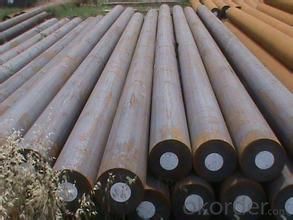
Quality Assurance:
1. We will strictly inspect our production that we sold according to the customer’s request.
2. Our steel reaches international quality standards.
3. Quality should be in conformity with the specification of the manufacturer. Quantity and packing conditions should be in conformity with the term in the contract.
4. Should the packing found damaged, the buyer has the right to claim to the seller
- Q: What are the different types of coatings for special steel?
- To enhance the performance and safeguard special steel against various environmental factors, a range of coatings can be applied. The following are some commonly used coatings for special steel: 1. Zinc-based coatings: These coatings, like galvanized steel, offer exceptional corrosion resistance. By acting as sacrificial barriers, the zinc layers protect the underlying steel from rusting. 2. Epoxy coatings: Renowned for their resistance to chemicals, moisture, and abrasion, epoxy coatings find extensive use in industries where steel is exposed to harsh conditions or corrosive substances. 3. Powder coatings: Providing a durable and visually appealing finish to special steel, powder coatings are applied as dry powder and cured under heat. This process forms a tough, protective layer that resists chipping, fading, and corrosion. 4. Ceramic coatings: Ceramic coatings are celebrated for their ability to withstand high temperatures and excellent thermal insulation properties. They are commonly utilized in applications involving extreme heat or rapid temperature changes. 5. Organic coatings: Acrylics and polyurethanes are examples of organic coatings that create a protective barrier against moisture, UV radiation, and chemicals. They are frequently employed in outdoor applications, such as architectural structures or automotive parts. 6. Phosphate coatings: Primarily used as pre-treatment before applying other coatings or paints, phosphate coatings enhance adhesion and corrosion resistance in subsequent layers, resulting in a more durable finish. 7. Polymer coatings: Polymer coatings exhibit exceptional resistance to abrasion, impact, and chemicals. They are often utilized in industrial settings where steel experiences heavy wear and tear. Selecting the appropriate coating for special steel is crucial, considering the specific requirements and environmental conditions it will encounter. Each type of coating possesses its own advantages and limitations, necessitating a comprehensive analysis to determine the most suitable option.
- Q: What are the requirements for special steel used in mining equipment manufacturing?
- Special steel used in the manufacturing of mining equipment must meet specific and rigorous requirements due to the harsh and challenging conditions associated with mining operations. Here are the key requirements: 1. Exceptional strength and toughness are necessary for the special steel used in mining equipment to withstand heavy loads, impact, and abrasion. This enables the equipment to endure the demanding conditions it encounters during mining operations. 2. The special steel used in mining equipment must exhibit exceptional wear resistance properties to minimize wear and prolong the equipment's lifespan. This is crucial because mining equipment is exposed to abrasive materials such as rocks, ores, and minerals. 3. Mining operations often occur in wet and corrosive environments, such as underground mines or near bodies of water. Therefore, it is important for the special steel used in mining equipment to have good corrosion resistance. This prevents rusting and degradation, ensuring the equipment's longevity and reliability. 4. Mining equipment, especially in applications like drilling or cutting, may generate significant heat during operation. Hence, the special steel must possess excellent heat resistance properties to withstand high temperatures without compromising its strength or hardness. 5. The special steel used in mining equipment should be easily weldable and machinable to facilitate the manufacturing process. This ensures that the equipment can be efficiently constructed, repaired, or modified as needed. 6. Mining equipment manufacturers often require special steel to meet specific industry standards and certifications, such as ISO 9001, ASTM, or API. Compliance with these standards guarantees that the steel used in the equipment meets the necessary quality and performance requirements. In conclusion, the requirements for special steel used in mining equipment manufacturing revolve around strength, toughness, wear resistance, corrosion resistance, heat resistance, weldability, machinability, and compliance with industry standards. Meeting these requirements ensures that the steel can withstand the demanding conditions of mining operations and contribute to the durability and performance of the equipment.
- Q: How does special steel contribute to the machinability of products?
- The role of special steel in enhancing product machinability is substantial. Machinability refers to a material's ease of being cut, drilled, or shaped through various machining processes. Special steel, also known as alloy steel, is formulated with specific elements that improve its machinability. One vital aspect of special steel that enhances its machinability is its composition. By incorporating elements like manganese, sulfur, and phosphorus, special steel achieves superior machinability compared to regular carbon steel. These elements reduce friction during machining, resulting in less tool wear and longer tool lifespan. Additionally, they facilitate the formation of smaller, more manageable chips during cutting, making it easier to control the machining process and maintain dimensional accuracy. Furthermore, special steel often undergoes specific heat treatment processes like annealing or quenching and tempering to further enhance its machinability. Heat treatment improves the steel's microstructure, making it more uniform and refined, consequently improving its machinability characteristics. Heat-treated special steel exhibits improved hardness, toughness, and resistance to wear, all of which are crucial for achieving high-quality machined products. Moreover, special steel can be engineered to possess other desirable properties such as high strength, corrosion resistance, or heat resistance while still maintaining good machinability. This versatility allows manufacturers to select the most suitable special steel for their specific machining applications, ensuring optimal performance and productivity. In summary, special steel plays a significant role in product machinability due to its specific composition, heat treatment processes, and versatile properties. By utilizing special steel, manufacturers can achieve better machining performance, improved tool lifespan, and higher dimensional accuracy, ultimately resulting in superior quality products.
- Q: How is special steel used in the production of automotive parts?
- Special steel is used in the production of automotive parts due to its exceptional strength, durability, and resistance to corrosion. It is commonly used in components like engine parts, suspension systems, and gears to ensure optimal performance, safety, and longevity of vehicles.
- Q: What are the factors that affect the fatigue strength of special steel?
- The factors that affect the fatigue strength of special steel include the composition of the steel, the heat treatment process used, the presence of impurities or defects, the surface finish, the loading conditions, and the operating environment.
- Q: How does special steel contribute to the aerospace racing industry?
- Special steel contributes to the aerospace racing industry by providing high strength, durability, and resistance to extreme temperatures, which are crucial for the development of advanced aircraft and spacecraft components. It is used in critical parts like turbine blades, landing gear, and engine components, enhancing performance, efficiency, and safety. Additionally, special steel's lightweight properties enable the production of lighter aircraft, resulting in improved fuel efficiency and increased speed.
- Q: How does special steel contribute to reducing product failures in high-stress applications?
- Special steel contributes to reducing product failures in high-stress applications by offering enhanced strength, durability, and resistance to corrosion and wear. The unique properties of special steel allow it to withstand extreme conditions, such as high temperatures and pressures, without deformation or failure. This ensures that the products made using special steel perform reliably and have a longer service life, minimizing the risk of failures and resulting in improved safety and cost-effectiveness in high-stress applications.
- Q: How does special steel contribute to the mining machinery industry?
- Special steel contributes to the mining machinery industry by providing high-strength and durable materials for the construction of mining equipment. With its exceptional mechanical properties and resistance to wear, corrosion, and high temperatures, special steel enhances the performance and longevity of mining machinery, ensuring efficient and reliable operations in harsh mining environments.
- Q: How does special steel perform in high-temperature creep resistance?
- Special steel is known for its exceptional performance in high-temperature creep resistance. Creep refers to the tendency of a material to deform or strain under constant stress when exposed to elevated temperatures. In such conditions, ordinary steels may exhibit significant creep, leading to a loss of mechanical properties and potential failure. However, special steels are specifically designed to withstand high-temperature creep, making them ideal for applications where resistance to time-dependent deformation is critical. These steels are often alloyed with elements such as chromium, molybdenum, and vanadium, which enhance their high-temperature properties. The alloying elements in special steels form stable carbides and nitrides, which act as strengthening agents, inhibiting grain growth, and preventing dislocation movement. This results in improved creep resistance and structural stability even at extreme temperatures. Additionally, special steels often undergo heat treatment processes such as quenching and tempering, which further enhance their creep resistance and overall mechanical performance. Furthermore, the microstructure of special steels is carefully controlled during the manufacturing process to ensure optimal creep resistance. Fine-grained structures with a high density of precipitates or second-phase particles are typically developed, which hinder dislocation movement and improve creep strength. In summary, special steels exhibit exceptional high-temperature creep resistance due to their alloying elements, heat treatment processes, and controlled microstructures. These steels can reliably withstand prolonged exposure to elevated temperatures without significant deformation or loss of mechanical properties, making them invaluable in industries such as aerospace, power generation, and petrochemicals where high-temperature applications are common.
- Q: What are the characteristics of special stainless steel?
- Special stainless steel is known for its unique properties that set it apart from regular stainless steel. Some of the key characteristics of special stainless steel include: 1. High Corrosion Resistance: Special stainless steel has a higher level of corrosion resistance compared to regular stainless steel. It can withstand exposure to harsh environments, such as saltwater or acidic substances, without corroding or deteriorating. 2. High Temperature Resistance: Special stainless steel is designed to withstand high temperatures without losing its structural integrity. It can endure extreme heat, making it suitable for applications in industries like aerospace, automotive, and power generation. 3. Enhanced Strength and Durability: Special stainless steel is often alloyed with other elements to enhance its strength and durability. This makes it highly resistant to deformation, cracking, and wear, ensuring its longevity and reliability in demanding conditions. 4. Excellent Mechanical Properties: Special stainless steel exhibits exceptional mechanical properties, including high tensile strength, toughness, and ductility. These properties make it ideal for applications that require high load-bearing capacity, such as structural components and machinery. 5. Unique Magnetic Properties: Depending on its composition, special stainless steel can exhibit various magnetic properties, ranging from non-magnetic to highly magnetic. This versatility allows it to be used in applications where magnetic properties are required, such as magnetic resonance imaging (MRI) machines or electrical transformers. 6. Hygienic and Easy to Clean: Special stainless steel is known for its hygienic properties, which make it suitable for applications in the food and healthcare industries. It is non-porous, resistant to bacteria growth, and easy to clean, making it an ideal choice for equipment and surfaces that require strict sanitary standards. 7. Aesthetic Appeal: Special stainless steel is often used in architectural and design applications due to its aesthetic appeal. It can be polished to a mirror-like finish, giving it a sleek and modern look. Additionally, it can be easily shaped and welded, allowing for creative design possibilities. In summary, special stainless steel possesses a combination of high corrosion resistance, temperature resistance, strength, durability, excellent mechanical properties, unique magnetic properties, hygienic features, and aesthetic appeal. These characteristics make it a preferred choice for a wide range of industrial, commercial, and domestic applications.
Send your message to us
Grade AISI4135 CNBM Alloy Steel Round Bar
- Loading Port:
- Shanghai
- Payment Terms:
- TT OR LC
- Min Order Qty:
- 25 m.t.
- Supply Capability:
- 10000 m.t./month
OKorder Service Pledge
OKorder Financial Service
Similar products
Hot products
Hot Searches
Related keywords

